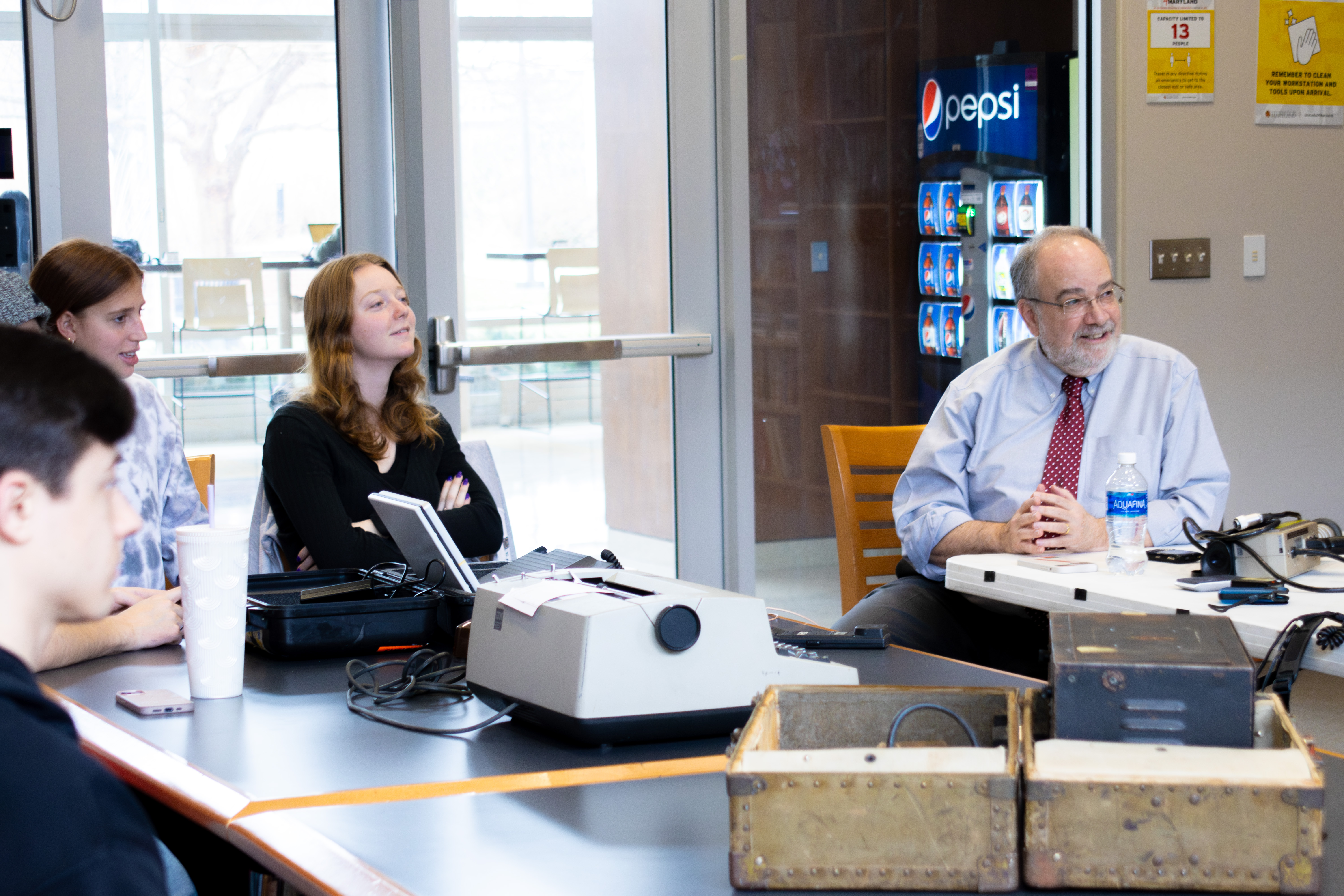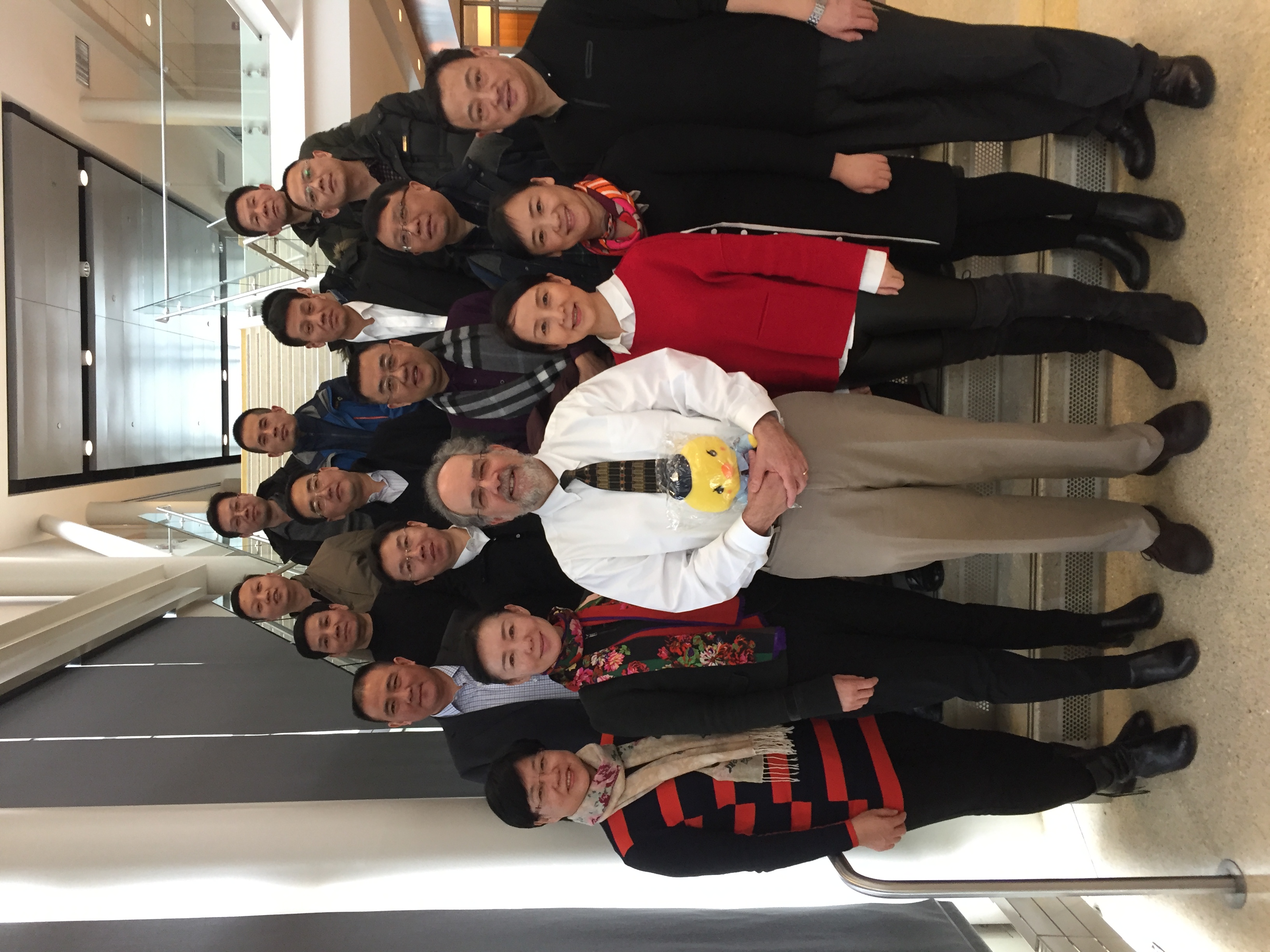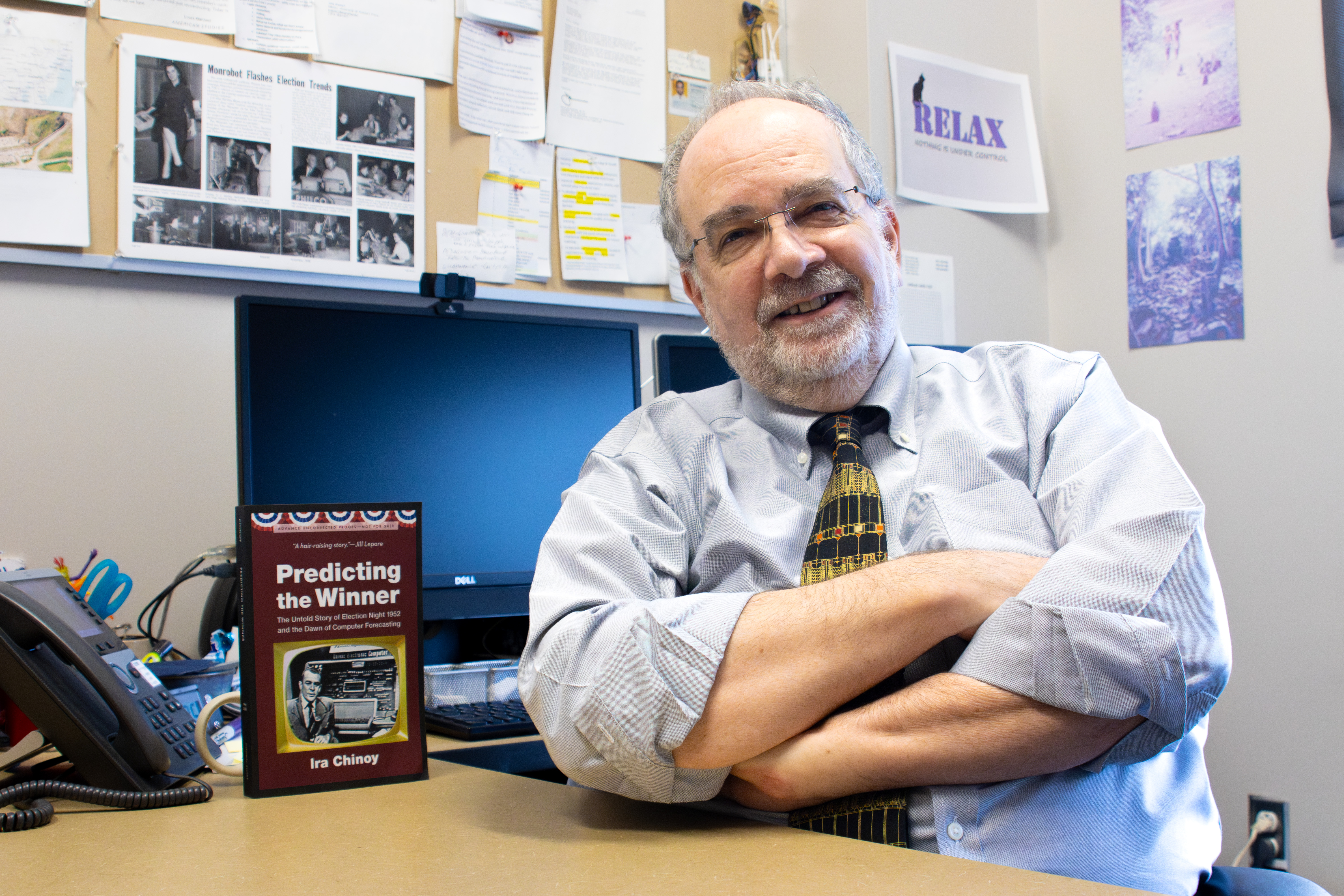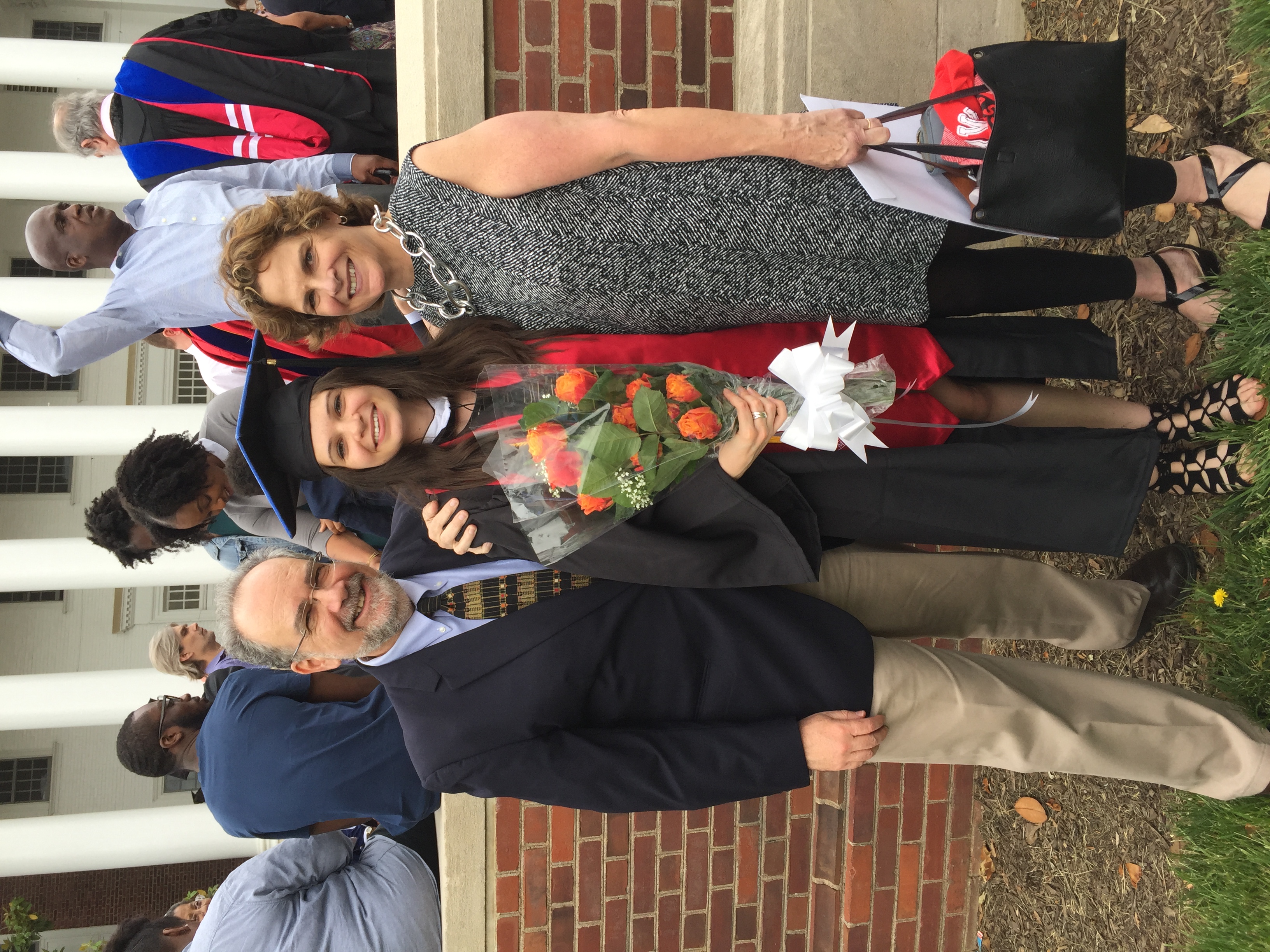After 23 years at the University of Maryland’s Philip Merrill College of Journalism, Associate Professor Ira Chinoy is preparing to say goodbye as he retires at the end of the spring semester. Chinoy has taught at every level of the college — from first-semester freshmen to Ph.D. students — and was at the forefront of introducing data journalism to Merrill College.
 Join us in Knight Hall on May 9 at 5 p.m. as Merrill College celebrates Chinoy ahead of his retirement and holds a discussion of his new book, “Predicting the Winner: The Untold Story of Election Night 1952 and the Dawn of Computer Forecasting.” Click here to register.
Join us in Knight Hall on May 9 at 5 p.m. as Merrill College celebrates Chinoy ahead of his retirement and holds a discussion of his new book, “Predicting the Winner: The Untold Story of Election Night 1952 and the Dawn of Computer Forecasting.” Click here to register.
Before joining the world of academia, Chinoy was a member of two investigative reporting teams that won Pulitzer Prizes during a remarkable journalism career that took him to such outlets as The Washington Post and The Providence Journal.
And he continued to achieve greatness at the University of Maryland. Chinoy’s impact since coming to Merrill College in 2001 is immeasurable and will persist through its future innovation. Chinoy, who was director of computer-assisted reporting at The Post, brought those skills to teach early data journalism classes at the college. He went on to become associate dean from 2012-14 and has been lead instructor of the introductory journalism course for freshmen.
Chinoy has won multiple awards for his teaching innovation and has been a mentor to countless members of the Merrill College faculty and student body.
As he approached the end of his final semester, Chinoy reflected on his decades-long career at Merrill and discussed the release of his book. The Q&A below has been edited for length and clarity.
What was Merrill like when you first started here?
We were in another building. It was really old and right next to the library. It feels like we were smaller in some way. We had more tenured faculty members and fewer adjunct faculty. So much has evolved since then in terms of what we teach and how we teach it. I was teaching data journalism and that was on the cutting edge, and now we have three, four or five people teaching it and so much more. There was a dictionary in every classroom, so you know, pretty quaint.
When we moved into Knight Hall, there was space to try different things. Initially, there was just going to be one online bureau, but everyone realized that we had to flip that around. And the menu of things that we teach has just really expanded. It's constantly in motion to respond to what's going on in the industry. As I tell my students, if you haven't learned anything new in the next five years, if you don't pick up any new skills, you're going to be a dinosaur. We're teaching you how to use these tools and how to be innovators, but you have to constantly innovate throughout the rest of your career.
How would you describe your own experience in the past 23 years here at Merrill?
I didn't know anything about teaching when I came here. I was at The Washington Post. I was an investigative reporter and data journalist. I was recruited to teach the one data journalism class that we had and anything else that I wanted to teach, but I had no idea what I was doing. And initially, I taught that data journalism class just to master’s students, and then I taught JOUR201 to freshmen.
My late parents were teachers, and they would just think it's hilarious that I turned out to be a teacher. It was not my game plan, but I had to learn as I went along about how to be a teacher and what was really important. And oftentimes, it's not exactly what's in the syllabus. I mentor a lot of new teachers now and I say, “What do you want them to take away from the course that's not necessarily in the syllabus?”
You never thought you would end up in education, so how did such a well-decorated reporting career land you in academia?
Who knows? I had been a reporter for almost a quarter-century and I was actually recruited to come here. I met Chris Callahan, who was then the associate dean, at a conference. I think really good journalists might have an idea about what the story is when they go out on it, but they are willing to be open to the idea that they have it upside down. I try to impart that to my students here.
A few years ago you became the lead instructor for the introductory journalism course. How have you seen that course evolve and what was it like being the first face that students saw at Merrill?
I love it. They're coming from high school, and this is such a big change for them. I have really learned to enjoy that and figure out how to make it work. During the pandemic, I was really nervous about the prospect of teaching that course online. So I invited every one of them to meet with me one-on-one for 15 minutes before the semester started. It sort of demystified the class and when they showed up in class the first day, it wasn't my first encounter with them. You have a really special responsibility if you are the face of the college for freshmen. I teach a class now that's primarily for seniors, and almost half the class are students whom I had before when they were freshmen in JOUR200, so I was with them until the very end. People think you teach and then the students go on their way, but you're really developing these relationships that can last a very long time — 23 years in one case that I can think of.
You were also one of the first professors to teach a course on computer-assisted reporting. How have you seen data journalism evolve, especially at Merrill?
When I started here, it was called Computer-Assisted Reporting. I think the basic idea behind the course is critical thinking — how do you get data, what do you make of it when you look at it, what assumptions are you making about what it means, are you reporting out how the data is gathered and how it's supposed to be used? The tools have changed since I taught it, but I think that the critical thinking part of it is what is at the heart of the course.
 Are there other things you've taken from your reporting experience into the classroom?
Are there other things you've taken from your reporting experience into the classroom?
Oh, yeah. Initially, I thought I wasn't going to tell a lot of war stories about my life as a reporter, but it turns out that there are things that I can bring into the class. When I'm mentoring other new teachers, many think the first class is just going over the syllabus, but it’s important to find a way to get everyone engaged right away and save the syllabus for later. You’ve got to set the hook in the first couple of minutes. You've got to make clear to them why they're there and that this is going to be an engaging experience. On the very first day of JOUR200, I put up a slide of a plane crash that happened outside Boston in a blizzard in 1980. I was a 20-something reporter and I got sent out in the middle of the night to cover that. We didn't have phones, so I needed to get a real map, a flightlight and an actual notebook. I had to figure out how to get there and what to do. So it's a real-world story, and it gins up a great conversation from the get-go.
You have won many awards for innovation, history and teaching. Can you tell us a little more about that?
I have a couple of ways that I've done that. One was how I adapted during the pandemic. One of the things that I did was get rid of exams and quizzes in JOUR200 because I couldn't see a way to proctor them online. And I thought, what's the point of taking the exam? You cram for two days before you take the test and two days later, you can't remember a thing that you crammed in your brain. I asked around the Teaching and Learning Transformation Center about what tools students can use to keep a journal of what they’re learning. I taught my students how to set up a simple, private webpage on Adobe Express. Every week I give them a prompt to to help them capture something salient. And instead of a quiz or midterm, there is a midterm essay. I give them the prompt well ahead of time and they can cut and paste right from their learning journal to connect the dots. I also turned the news quizzes into online discussions about news. So those were a few things that worked so well that I've used it in every other class.
You received your Ph.D. in journalism from Merrill College. What was the transition going from a full-time reporter to someone fully in academia like?
It was like having two jobs at once because I was teaching full-time and I was in the Ph.D. program full-time. I didn't really appreciate how much work that was gonna be. Those were just really busy years. I'm not afraid of hard work. I've worked hard, but they were. I've always liked learning. I've always liked research. I mean, a really good investigative reporter is a researcher. And I found a lot of parallels when doing that kind of research and doing the historical research that I did, so I just sort of morphed those skills over to working on my dissertation.
So your new book, “Predicting the Winner: The Untold Story of Election Night 1952 and the Dawn of Computer Forecasting,” comes out May 1. Could you explain what it's about and what that process of putting it together was like?
There was an earlier version that was my dissertation, which was called “Battle of the Brains: Election Night Forecasting at the Dawn of the Computer Age.” I was initially interested in why there was so much pushback against using the computer as a tool in the newsroom. I began to think about how journalism and computers first hooked up. And it turned out that it was a long time ago — Election Night 1952.
 The book is about how and why computers got their rollout in journalism on an election night. There's a famous picture of President Truman in 1948 holding up a newspaper headline that said “Dewey defeats Truman” when the newspapers got it wrong and the TV got it wrong — this new medium that's supposed to be great for news didn't work out so well.
The book is about how and why computers got their rollout in journalism on an election night. There's a famous picture of President Truman in 1948 holding up a newspaper headline that said “Dewey defeats Truman” when the newspapers got it wrong and the TV got it wrong — this new medium that's supposed to be great for news didn't work out so well.
Journalism is the way that people know what happens on election night. There's no national entity that tells us who has won the election, and this idea of using early returns to predict the winner turned out to be a science that evolved for decades and decades before we had computers. Computers were just the newest tool to use. Election nights were a place to roll out new technologies, so there was this connection between election night reporting and the culture in journalism that I found kind of fascinating.
And what happened along the way? This catastrophic election night of 2020. The final chapter in the book is about how we move forward when a lot of people just didn't believe the outcome. This is a spoiler alert, but the thesis of that chapter is that it's not better math that's going to get us to people believing the outcome. The people who are on the losing side have to be able to believe that that outcome was possible, and we have to solve two problems to make that happen. One is an overall decline in trust going on for generations in news. And the other is the rising mass of what are called news deserts, places where there is just not any local news. Seventy million Americans now live in a news desert. And in survey after survey, the news that people trust the most is local news, so we're never really going to solve that election night problem unless the news industry as a whole gets together with other actors in society and figures it out.
What has the process of this book becoming reality been like and what do you hope for as it gets released in May?
It’s been surreal. It's a huge process to do a book, even after you've written the book. I got an agent, and the agent said, “Well, for starters it’s too long. You’ve got to cut out about 30,000 words.” And he was right, that made it better. And then you’ve got to find a publisher. My agent sent it out to a bunch of publishers, and the first 10 or so took a pass. I was really dejected about it, and I was talking to a friend of mine who's a really well-known writing coach. He said, “Oh, let me send you something,” and it was an article he'd written about famous rejection letters. I eventually got a publisher, but it's just a big process. There's copy editing and lots of moving parts. Now I'm working on marketing, and you have to do a lot of it yourself. It’s kind of never-ending and I'm accepting every offer extended to me to do talks and to write. It's not over when you're done with the book — that's just the beginning.
What were your favorite memories in the past 23 years here? And what are you most proud of doing?
I'm proud of having figured out how to be a teacher, which I think I sort of figured out. I'm proud of being able to help mentor other faculty. I am also really proud of the relationships I've built with students. Those are gold. They're just amazing. My third or fourth day as a teacher was 9/11. I didn't really know how to be a teacher then. We were in a classroom when the towers came down, and I didn't even know how to turn the TV on. I'm in touch with several of those students even today, 23 years later. And every year on 9/11, one of those students sends me an email to kind of remember the day and update me on her life. So now she's married and she's got kids and she's a senior TV producer, but I look forward to that like every year. And during the pandemic, I had 60 students and two sections. At the end of the semester, I sent the students off into a breakout room on Zoom where they could do their course evaluations. And one day when they were supposed to come back on the screen, nobody was there yet. I thought, “I just completely messed up something now,” and my TA had her iPhone up and was about to take a picture of something. I said, “What is going on?” And she said, “You'll see,” and then they all turned on the cameras. They all had a sign that said, “Thank you, Professor Chinoy” or “We love you, Professor Chinoy.” It was just incredible. You can't even put a price on that. That was a really, really a peak experience for me.
What is some advice that you would give faculty and any students?
We always have to dig down and figure out who we are, what we're about, and what is it we want to do for the other people that we are dealing with. Otherwise, you're just kind of going through the motions. Students know when you're phoning it in. I know because they've told me that about other classes they're having around campus. I think you have to really know what it is that you want them to take away. Before every class in my class notes, I have a few lines about what I want the really big takeaway from here to be. If we pull the camera up to 30,000 feet, what is it I want them to see? And how can I get them to do the thinking to do that? You’ve got to know yourself to be a decent teacher.
 Where do you hope Merrill College is going in the future?
Where do you hope Merrill College is going in the future?
I'm a huge fan of the dean. Rafael Lorente has been my friend for a long time, and I think he's just on fire. We've done so much innovating, even just in the last couple of years. Our strength is that we can be nimble. We're not caught up in a lot of bureaucracy. If we need to go in a direction, we go in that direction. We have a working committee of faculty that think together about the curriculum and then we put it up to the whole college assembly — to faculty and representative students and staff — and we move in that direction. We don't mind abandoning things and going off in another direction. And I think Rafael is the one who's really driving that ship. I just think we need to do more of the same to continue on with that. And I won't be here. I mean, I'm retiring at the end of the semester, but I will be here in spirit and I'm sure I'll still be in touch with people all the time.
Do you have any plans for your retirement?
I do, yeah. It’s not really going to be retirement. I just won't be teaching anymore. I have two other books that I wanted to write, and over the summer after I put out the book, I want to put together some little videos, enter the TikTok generation, or Instagram or something like that. And we are eventually going to move in the not-too-distant future. My daughter and son-in-law are moving to upstate New York and they asked us if we would move with them. We said yes. They're going to start their own family, so the idea of keeping my wife and daughter 6½ hours apart was never going to happen. So that's kind of the plan.
